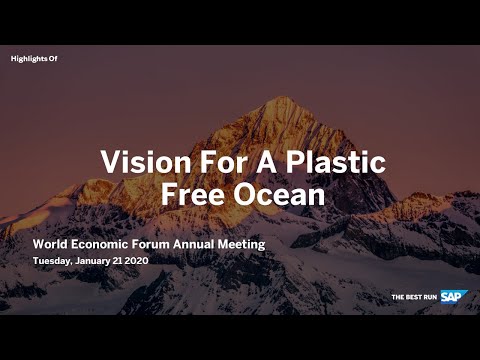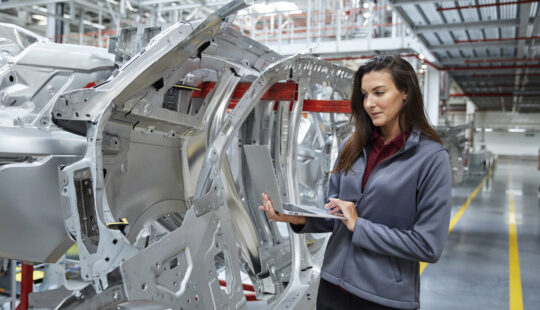This week at the World Economic Forum, SAP announced its vision for a plastic-free ocean by 2030. Co-CEO Christian Klein made the company’s global ambition clear at the annual meeting in Davos, Switzerland.
“SAP is committed to a dramatically cleaner ocean by 2030,” Klein said. “We can achieve this commitment by working together with customers, NGOs, governments, and partners, and by providing them with the tools, insights, and solutions to eliminate waste and maximize resource productivity. Many of our customers have made commitments to a cleaner planet, and so have we. We will support them in achieving their ambitious goals, and together we will achieve a plastic-free ocean over the next 10 years.”
The health of the world’s oceans is at the top of the agenda in Davos, and Klein was part of a panel session with other business leaders and nongovernmental organization (NGO) representatives at the event.

The crisis is very real: 8 million metric tons of waste enters the ocean every year and the amount is increasing an accelerating pace. Recently published research indicates the levels of plastics in the ocean may be a million times higher than previously thought. Plastic material slowly degrades into micro-plastics that harm the ecosystem and enter the ocean food chain. On average, people around the world are swallowing a total of five grams — about as much as a credit card — of harmful plastic material every week. That’s the equivalent of a half a pound yearly, ingested from many sources, including tap water and everyday foods such as sugar, salt, pasta, shellfish, rice, milk, and bread.
We know that the well-being of the economy, the environment, and the people on our planet are inextricably linked. It is understood that there can be no economic growth or development if business does not play a key role in operating profitably within planetary boundaries. A fundamental shift is needed in how we produce, use, dispose, and re-use materials in our economies. The current system is largely linear, meaning resources are used in production, made into products, and then are disposed of in the form of waste.
To sustain this “take, make, waste” lifestyle, 1.8 planets worth of resources are needed; the current model is clearly unsustainable. An emerging circular economy aims to change that. Despite all the efforts in responsible packaging design, recycling programs, and re-use business models, we are only about nine percent circular, according to the Circularity Gap report.
SAP: Uniquely Positioned for Impact
With consumers shifting their preferences to sustainable products, investors and employees clamoring for action, and regulators pushing new legislation, there is enormous momentum for businesses to drive responsible growth. And with 77 percent of the world’s transactions touching SAP systems and more than 430,000 companies using SAP software, the company is uniquely positioned to make a huge difference by helping customers redesign global value networks toward more circular business models and processes.
SAP has been leading programs and partnerships to drive sustainable change around the world. SAP created the SAP Leonardo plastics challenge and partnered with Google on the Circular Economy 2030 challenge to foster revenue generating ideas that support circular use cases. The company also recently joined the Ellen MacArthur Foundation’s Circular Economy 100 (CE100) Network, a collaborative network of business, innovators, cities and governments, universities, and thought leaders all working together to accelerate adoption of circular economy practices and processes that maximize the use of resources.
SAP is part of a growing movement of policymakers, NGOs, social groups, and leading companies coming together to work on solutions such as avoiding single-use plastics, better managing and recycling plastic waste streams, and creating a circular plastics economy.
Many of the world’s leading brands are both part of the challenge and leading the way forward. For example, companies in the consumer packaged goods industry have started rethinking packaging and opting for more recyclable and sustainable alternatives.
Aside from the benefits gained from preserving the natural environment, there is a massive economic upside for business to move fast. It is projected that by 2050 the plastics industry could consume 20 percent of total global oil production. Since most plastic is used only once, 95 percent of its economic value — currently up to $120 billion annually — is lost.
Coca-Cola, for example, has committed to a world without waste by making all packaging 100 percent recyclable by 2025. Nestlé also aims to eliminate non-recyclable plastic within five years. Unilever is a role model in responsible production by managing every stage of a product’s life cycle — from sourcing raw materials to manufacturing and distributing products — in order to reduce environmental impact.
SAP is already working with these customers and many others to help them manage the complex task of recycling many different types of plastics.
Impact Across the Value Chain
The SAP vision for a plastic-free ocean calls on these customers and other global heavyweights to accelerate progress on their commitments. It also calls on companies of all sizes and industries to seek ways SAP technology can help them in key areas, including responsible production, waste insights, secondary marketplaces, and consumer experiences.
SAP has a number of solutions and platforms, including the SAP Digital Supply Chain portfolio, that enable manufacturers to design, produce, and distribute products using more sustainable materials and responsible, transparent processes. The Plastics Cloud, for example, is a platform that enables the UK Plastics Pact to tackle the scourge of plastic waste through a unique collaboration between business, government, and citizens across the entire plastics value chain in the UK.
A US$400 billion market, the waste management industry is poised to be disrupted and rapidly expand through the effective use of data. Michael Groves is founder and CEO of Topolytics, the Scottish smart-waste company that won the Circular Economy 2030 challenge this year. He explains that the waste value chain is very complex and opaque, with many private and public sector players and a significant informal sector around the world. Realizing that money follows data, Groves developed a solution that uses analytics and machine learning to follow trash as it travels. Clear data and insights will be fundamental to spurring investments in new infrastructure and innovation in the sector.
With useful data available about what waste is where and in what quality and quantity, companies can then procure this waste much more effectively and bring the materials back into their production processes. The expansion of these secondary materials marketplaces is another area where procurement platforms like SAP Ariba software can help companies become more circular and sustainable.
SAP’s intelligent enterprise strategy focuses on connecting enterprise operational data (O-data) with the experience data (X-data) from their consumers. The company’s recent acquisition of experience management firm Qualtrics offers an entirely new level of support for companies to understand their consumer feelings, emotions, and desires about products, brands, and the impact they are making. Innovations across SAP offer customers ways to inform, educate, and engage with consumers about products and processes, including apps that help consumers better understand how to recycle products and blockchain traceability and information platforms.
“Many of our global customers are looking for solutions across their value chains and across their global markets to drive real positive change for their consumers, their business, and for the planet,” Klein said. “Through our technology and innovation, SAP can help companies unlock US$4.5 trillion in economic growth by creating sustainable business models and processes.”
Follow me on Twitter: @magyarj



